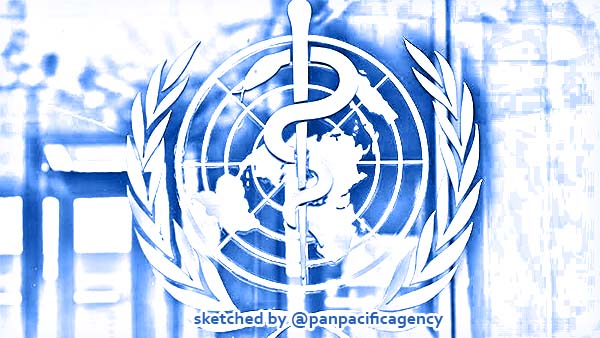[Analytics] What does US leaving the WHO mean for Taiwan’s campaign to rejoin?

World Health Organization (WHO) logo. Sketched by the Pan Pacific Agency.
As the US begins the process of withdrawing from the World Health Organisation, it raises a big question for Taiwan: where does this leave its bid to rejoin the WHO’s decision-making body? Lawrence Chung specially for the South China Morning Post.
Washington’s support has been crucial in Taipei’s push to take part in the World Health Assembly, something Beijing – which sees Taiwan as part of its territory – has blocked since the independence-leaning Democratic Progressive Party took power in 2016.
For now, the self-ruled island says it is not giving up.
Taipei was ousted from the WHO, a UN body, in 1972 – a year after it was expelled from the United Nations when Beijing joined. After a long campaign, it rejoined as a WHA observer in 2009, helped by Kuomintang president Ma Ying-jeou’s policy of engaging with Beijing.
But that status was revoked four years ago, when Tsai Ing-wen took office and refused to accept the one-China principle. Since then, Beijing – which is influential in the WHO – has maintained that Taipei can only take part with its consent. And as tensions mount across the Taiwan Strait, that consent has not been forthcoming.
With the US formally notifying the UN secretary general on Tuesday that it will leave the WHO in July next year, Taiwan is now in a difficult position.
Yen Chen-shen, a senior researcher with National Chengchi University’s Institute of International Relations, said Taipei had been counting on Washington for the WHA bid.
“This is really embarrassing. The Tsai government has considered the US a reliable and amiable partner since Donald Trump became president in 2017 and chose to ally with Taiwan in countering Beijing,” Yen said.
Although they do not have formal diplomatic relations, Washington has shown strong support for Taipei on the global stage. It was one of the voices calling for Taiwan to be given observer status at the WHA ahead of its last meeting in May. But Taipei decided not to raise the issue at that short two-day session, held by video link because of the coronavirus pandemic. It will now wait till the body meets again later this year – and it will rely on support from the US, Canada and other countries.
Trump announced the US withdrawal and a funding halt to the WHO in May, accusing it of mishandling the pandemic and claiming it was a puppet of Beijing. Before that, he and other senior US officials had promoted Taiwan’s bid to rejoin the WHA, saying there should be no gaps in global health and pointing to the island’s success in containing the virus outbreak.
“But how can the US convince others to support Taiwan’s bid when it now sees the WHO as a rotten body?” Yen asked, referring to US Secretary of State Mike Pompeo’s criticism that the organisation had “historically been incompetent” and that it was corrupt and politicised.
Yen said the Tsai government needed to be cautious in dealing with Trump, given his track record of going back on his word and his preference for unilateralism.
Li Da-jung, a professor of strategic studies at Tamkang University in Taipei, said Trump’s decision on the global health body was a test for the Tsai government as it considered whether to continue its WHA campaign.
“In withdrawing, the US has made no mention of Taiwan, nor has it announced any plan to set up a new group, a substitute for the WHO,” Li said, adding that Taipei needed to be prudent in taking its next step.
“If Taiwan follows the US move and decides not to continue with the campaign, it would basically be giving up this long-time goal – and without an alternative group to join, it would end up isolating itself from the world health system,” Li said.
But former defence minister Michael Tsai said the island should keep pushing.
“The WHO is a global health body that has existed for many years, and as a responsible stakeholder safeguarding world health Taiwan must step up efforts to rejoin so that it can contribute to this work,” said Tsai, who heads the Taiwan United Nations Alliance campaigning for the island to join the body.
Foreign ministry spokeswoman Joanne Ou said joining the WHO was a long-standing and important goal that Taipei would not give up – and it had been encouraged by fresh support from Australia and Japan.
“Covid-19 has been rampant all over the world, making it unacceptable for any part of the world to become a gap in the anti-pandemic cooperation,” she said, adding that Taipei had received global praise for its handling of the health crisis, which had won more support for its WHA bid.
“At this stage, the foreign ministry will continue to strengthen cooperation with the US and like-minded countries and allies to win recognition and support … for our appeal,” she said.
Lawrence Chung covers major news in Taiwan, ranging from presidential and parliament elections to killer earthquakes and typhoons. Most of his reports focus on Taiwan’s relations with China, specifically on the impact and possible developments of cross-strait relations under the pro-independence Democratic Progressive Party and mainland-friendly Kuomintang governments.